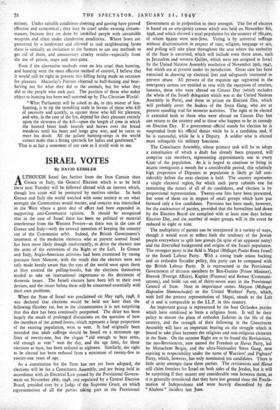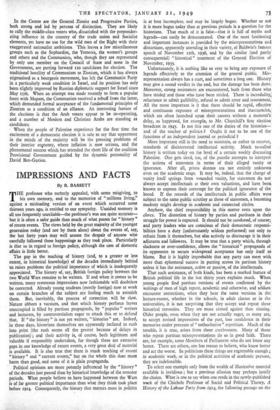ISRAEL VOTES
By DAVID KESSLER
ALTHOUGH Israel lies further from the Iron Curtain than Greece or Italy, the General Election which is to be held there next Tuesday will be followed abroad with an interest which, though less acute will be prompted by motives similar. In both Greece and Italy the world watched with some anxiety to see what strength the Communists would muster, and concern was intensified in the West where a great deal of effort had been expended in supporting anti-Communist opinion. It should be recognised that in the case of Israel there has been no political or material interference from the Western Powers—as there was in the case of Greece and Italy—with the avowed intention of keeping the country out of the Communist orbit. Indeed, the British Government's treatment of the moderate elements who at present control Israel has been more likely though inadvertently, to drive the electors into the arms of the extremists of the Right or the Left. In Greece and Italy, Anglo-American activities had been countered by strong pressure from Moscow, with the result that the electors were not only made keenly aware that the eyes of the world were upon them as they entered the polling-booths, but the elections themselves tended to take on international importance to the detriment of domestic issues. The Israeli electors have been left to their own devices, and the issues before them will be concerned essentially witli their own problems.
When the State of Israel was proclaimed on May 14th, 1948, it was declared that elections would be held not later than the following October 1st, but in the circumstances it is not surprising that this date has been continually postponed. The delay has been largely the result of prolonged discussions on the question of how the members of the armed forces, which represent a large proportion of the existing population, were. to vote. It had originally been intended that adult suffrage should be based on a minimum age limit of twenty-one, but the slogan " old enough to bear arms, old enough to vote " won the day, and the age limit, for these elections at least, has been reduced to eighteen. Similarly, the right to be elected has been reduced from a minimum of twenty-five to twenty-one years of age.
As a constitution for the State has not yet been adopted, the elections will be for a Constituent Assembly, and are being held in accordance with an Electoral Law passed by the Provisional Govern- ment on November 18th, 1948, and regulated by a Central Election • Board, presided over by a Judge of the• Supreme Court, on which -14presentatives of all the parties taking part in the Provisional
Government sit in proportion to their strength. The list of electors is based on an emergency census which was held on November 8th, 1948, and which' showed a total population for the country of 782,000, of whom 69,000 were non-Jews. -Voting is by universal suffrage without discrimination in respect of race, religion, language or sex, and polling will take place throughout the area where the authority of the State is exercised, which will include even those areas, such as Jerusalem and western Galilee, which were not assigned to Israel by the United Nations Assembly resolution of. November 29th, 1947, but which are at present under its jurisdiction. Great care has been exercised in drawing up electoral lists and safeguards instituted to prevent abuse. All persons of the requisite age registered in the emergency census are entitled to vote with the e4ception of tourists, lunatics, those who were abroad on Census Day (which includes the whole of the Israeli delegation which was at the United Nations Assembly in Paris), and those in prison on Election Day, which will probably cover the leaders of the Stern Gang, who are at present standing trial for..terrorist activities. The right to be elected is extended both to those who were abroad on Census Day but can return to the country and to those who happen to be in custody on Election Day. If a government official stands for election he is suspended from his official duties while he is a candidate and, if he is successful, while he is a Deputy. A soldier who is elected must relinquish his military functions.
The Constituent Assembly, whose primary task will be to adopt a constitution Of which a draft has already been prepared, will comprise 120 members, representing approximately one to every 6,500 of the population. As it is hoped to continue to bring in 20,000 immigrants a month for a considerable period, this relatively high proportion of Deputies to population is likely jo fall con- siderably before the next election is held. --The country represents a single electoral region, for which each party submits one list containing the names of all of its -candidates, and- election is by proportional representation. Twenty-one lists have been presented, but some of them are in respect of small groups which have put forward only a few candidates. Provision has been made, however, for the coalescence of parties, provided that the formalities laid down by the Election Board are complied with at least nine days before Election Day, and the. number of major groups will in the event be reduced 'to eight or nine.
The multiplicity of parties can be interpreted in a variety of ways, though it would seem to reflect both the tendency of the Jewish people everywhere to split into groups (in spite of an apparent unity) and the diversified background and origins of the Israeli population. The strongest party in the field is Mapai (Mifieget Poalei Eretz Israel) or the Israeli Labour Party. With a strong trade union backing and an orthodox Socialist policy, this party can be compared with the British Labour Party. It is represented in the Provisional Government of thirteen members by Ben-Gurion (Prime Minister), Shertok (Foreign Affairs), Kaplan (Finance) and Remez (Communi- cations), and holds ten out of thirty-seven seats in the Provisional Council of State. Next in importance comes Mapam (Mifleget Hapoalim Hameuchedet) or the United Workers' Party, which, with' half the present representation of Mapai, stands to the Left of it and is comparable to the I.L.P. in this country.
An important group is represented by the four Orthodox parties which have combined to form a' religious front. It will be their policy to ensure the place of orthodox Judaism in the life of the country, and the strength of their following in the Constituent Assembly will have an important bearing on the struggle which is bound to take place between the religious and non-religious elements in the State. On the extreme Right are to be found the Revisionists, the neo-Revisionists, now named the Freedom or Herut Party, led by 'Manachem Beigin, and the ultra-Nationalist Stern Gang, now aspiring to respectability under the' name of Warriors',and Fighters' Party, which, however, has only nominated ten candidates. There is little unity amongst these three parties. The revisionists and Herut still claim frontiers for Israel on both sides of the Jordan, but it will be surprising if they muster any considerable vote between them, as it is generally considered that they have lost ground since the Procla- mation of Independence and were heavily discredited by the " Altakna " incident last June.
In the Centre are the General Zionist and Progressive Parties, both strong and led by persons of distinction. They are likely to rally the middle-class voters who, dissatisfied with the preponder- ating influence in the country of the trade union and Socialist elements, yet have no use for the wild men of the Right with their exaggerated nationalist ambitions. This leaves a few miscellaneous groups such as the Sephardim, the Yemenis, the women's groups and others and the Communists, who, though they are represented by only one member on the Council of State and none in the Government, are putting forward 120 candidates for election. The traditional hostility of Communism to Zionism, which it has always stigmatised as a bourgeois movement, has left the Communist Party
in a particularly weak condition in Israel, and its position has only been slightly improved by Russian diplomatic support for Israel since May 15th. When an attempt was made recently to form a popular front with Mapam, the Communists received a rebuff from the latter, which demanded formal acceptance of the fundamental principles of Zionism as a condition of an affiance. An interesting feature of the elections is that the Arab voters appear to be co-operating, and a number of Moslem and Christian Arabs are standing as candidates.
When the people of Palestine experience for the first time the excitement of a democratic election it is safe to say that uppermost in the minds of the majority will be the pressing problems of their interior economy, where inflation is now serious, and the phenomenal success which has attended the short life of the coalition Provisional Government guided by the dynamic personality of David Ben-Gurion.







































 Previous page
Previous page